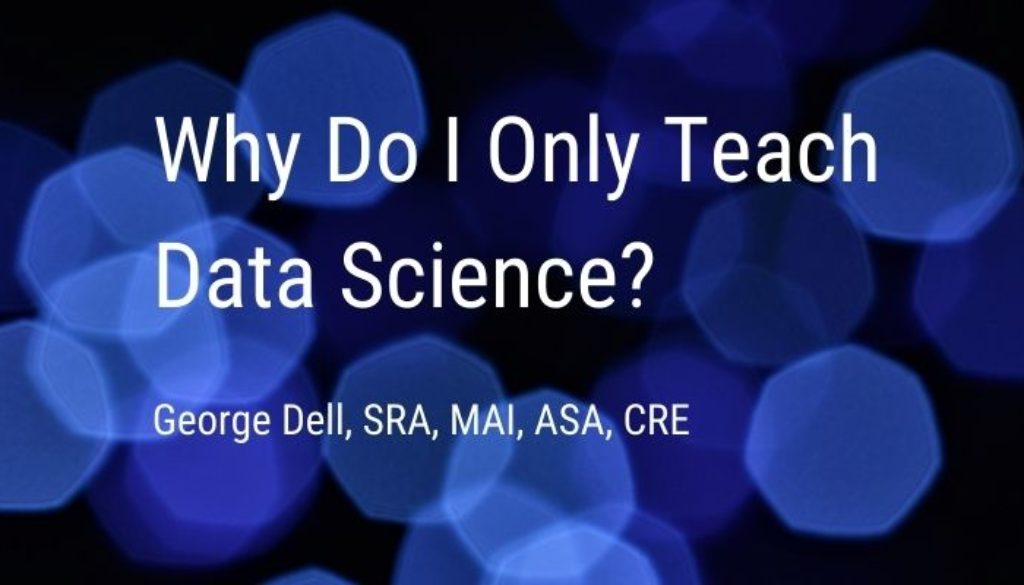Data science is new ways of thinking, new tools, computation, and visualization.
For valuation, it is simply optimizing the best of appraiser judgment and computer power.
Traditional appraisal theory is good. It is a subset of economic theory. What is different is the available data and algorithms to select and predict from that data. Also different is the ability for appraisers to better fill market needs with new services. Teaching the data science approach builds on what we already know, tweaked to revise old ways of thinking, old forms, and spreadsheets boxes.
We learn to provide understandable analytic results, in place of an opinion (everyone has one).
As I started this blog, it seemed difficult to provide more than two or three reasons how I ended up teaching only data science for valuers. We call it Evidence Based Valuation (EBV)©. Then my list grew.
Needed. The traditional point value opinion is obsolete. Analysis, not prose is needed.
Fun. The mental switch to measuring markets instead of comparing comps is a joy.
Passionate. It is much more fun to deliver a bulletproof product, instead of having to be defensive.
Focused. The goal is a measurably reliable result, not an ambiguous “worthy of belief” opinion.
Modern. Today’s valuation tools integrate with today’s client systems.
Easier. Data science critical reasoning and clear tools are more straightforward to work with.
Attractive. Visuals, including graphs, tell the story with color and shape and comparison
Robust. Results with visuals are understandable by a wide range of client competence.
Intuitive. Once learned, it eliminates some of the “common sense” ambiguities.
Hope. Provides a forward path for the appraisal profession, not living in the past.
Rewarding. Brings a sense of new accomplishment, not defending outdated ‘process.’
Inclusive. Clarifies when old ‘sparse data’ thinking is still necessary.
Incremental Builds on old education and practical experience.
Natural Intuitive thinking parallels the reality of “appraisal is market analysis.”
Complete. Avoids the fundamental problem of ‘missing data’ with traditional comparable selection.
Freeing. Empowers the unlearning of old unnecessary methods and habits.
Clear Unclutters and dispels old ambiguities in standards and regulations.
Focused. Gets to the real issue of analytics: risk/reliability of the value conclusion.
Enabling. Allows and promotes future growth in valuation theory and practice.
Professional. Puts the profession into the lead, rather than reacting to client and regulator edicts.
Aligned. Brings the profession to the real goal of serving the public good.
For me, I get great satisfaction from helping a profession which has been so good to me. I was blessed with accidental knowledge of a variety of fields which later came together to be called ‘data science.’

June 30, 2021 @ 6:51 am
Thank you George, not only for bringing this to an industry that is in so much of a need to improve their viability before they are eliminated by technology.
As you know, I had taken all of the courses the SREA, AIREA and AI had to offer, along with additioinal courses from the ASA and IRWA, not to mention dozens of courses in graduate school on appraisal.
When I took the first Stats & Graphs class with you in Palm Springs in 2006, it was refreshing to learn new things not being covered by traditional appraisal teachings.
Somewhere along the line, I lost track of how many times I have taken your courses at about 15 times. The point being, each time I have learned something new and I find it to be new and improved.
Moving away from point values has been a blessing in my life. My clients like it for the most part, though most are not from the world of lending. I find it so much more defensible to provide a supportable range, than an absolute point value. Judges and juries seem to understand that it is not an absolute.
I particularly enjoy when I work on a case and end up being deposed or cross examined and have the opportunity to explain (at $500 and hour) my scope of work, methods used and conclusions drawn. Even when asked about something outside of my scope and responding that I was not asked to do it, but could do it and as a result of the question would be willing to do it if instructed by my client or the judge, smile.
Along my path, I went frombeing one of the original skippies, trained to do 3-reports per day, to tryiing to become a professional appraiser as defined by the Real Estate Appraisal Terminology book (SREA, 1982).
Two degrees and two professional credentials later, combined with the things I have learned from you; I feel like I am approaching the journeyman level in this business and that makes me happy in my heart.
I credit you with making this fun again for me and helping me amp up my reputation. I make more money doing fewer reports, and have more time for things like dancing and traveliing.